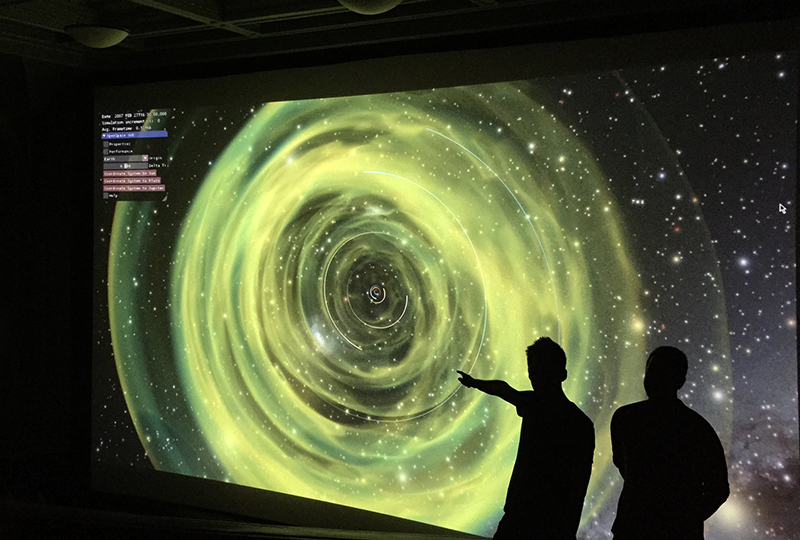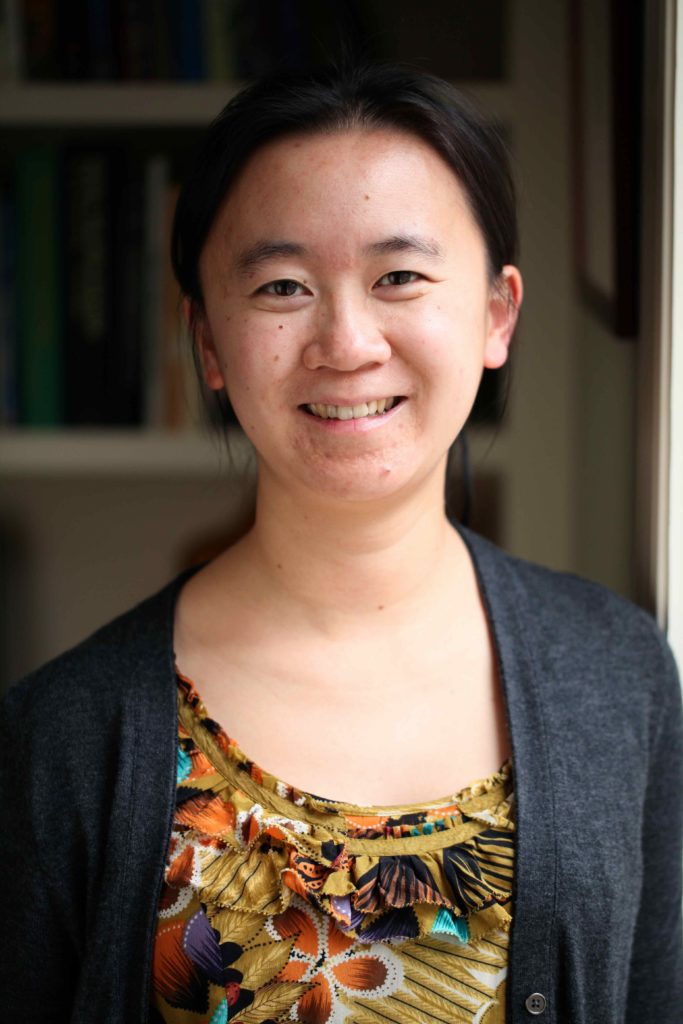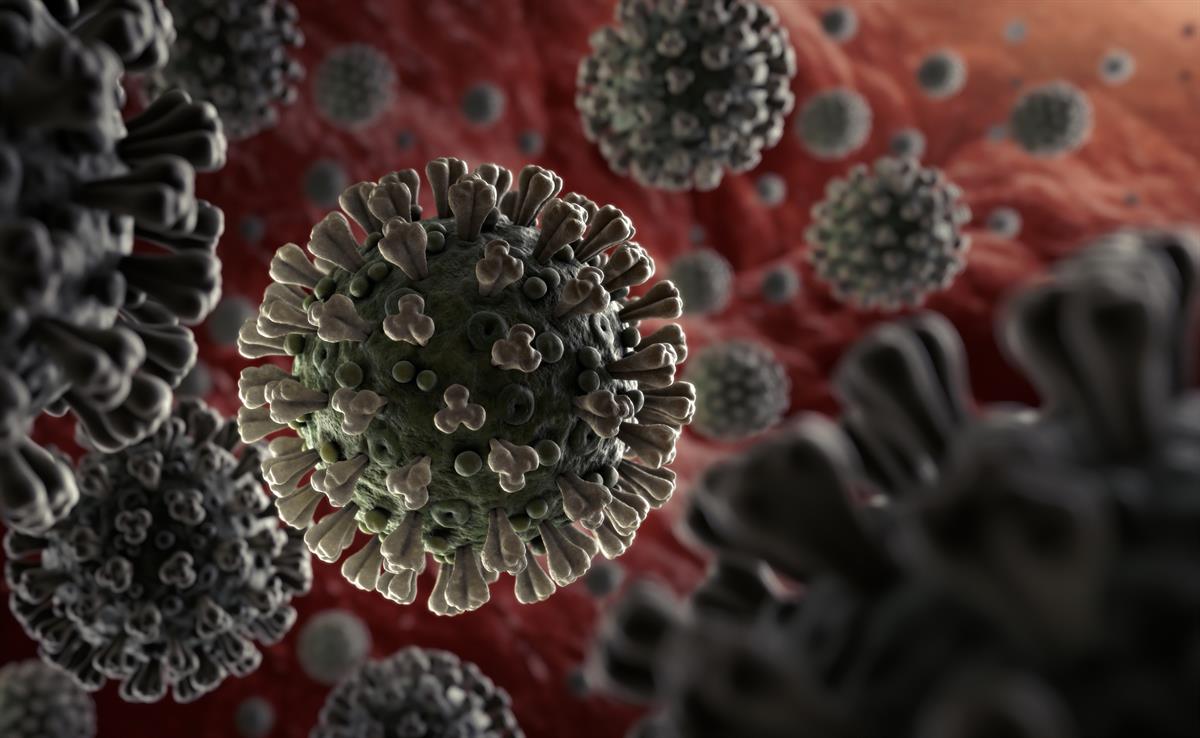Jeff Weiss Receives Distinguished Research Award
 Congratulations to Jeff Weiss for receiving the Distinguished Research Award that recognizes outstanding achievement and excellence in scholarly and creative research.
Congratulations to Jeff Weiss for receiving the Distinguished Research Award that recognizes outstanding achievement and excellence in scholarly and creative research. Professor Weiss received his bachelor’s and master’s degrees in Bioengineering at the University of California, San Diego, his doctorate in Bioengineering at the University of Utah in 1994, and completed postdoctoral training with the Applied Mechanics Group at Lawrence Livermore National Laboratory (1995-96).
OpenSpace Project Renewed for 5 More Years

ENLIL simulation at AMNH's LeFrak theater
Former U Researcher Wins Academy Award
 If it weren’t for an important computer graphics technique seen in special effects for movies known as “ray tracing,” Spider-Man would appear as a flat, lifeless superhero, or Thanos from “The Avengers” would just be a one-dimensional super villain.
If it weren’t for an important computer graphics technique seen in special effects for movies known as “ray tracing,” Spider-Man would appear as a flat, lifeless superhero, or Thanos from “The Avengers” would just be a one-dimensional super villain.Thanks to ray tracing – a computer graphics rendering technique that allows light to interact with objects in a realistic manner – special effects in blockbuster films have an ultra-realistic look that can fool audiences into thinking they are viewing genuine objects. Ingo Wald, a pioneer in ray tracing who conducted much of his work at the University of Utah’s Scientific Computing and Imaging Institute (SCI), will receive a Scientific and Technical Academy Award Feb. 13 along with four other researchers, all of whom developed ray tracing for Intel. They include Sven Woop, Carsten Benthin, Attila T. Áfra and Manfred Ernst.
New Leader Named for SCI Institute
 National Science Foundation and Office of Science and Technology (OSTP) veteran, Professor Manish Parashar, a distinguished professor of computer science at Rutgers University, will join SCI on January 1, 2021.
National Science Foundation and Office of Science and Technology (OSTP) veteran, Professor Manish Parashar, a distinguished professor of computer science at Rutgers University, will join SCI on January 1, 2021.“We are thrilled to have a leader like Professor Parashar take the helm at the Institute,” said Dan Reed, senior vice president for Academic Affairs. “He brings an unparalleled depth and breadth of experience in cyberinfrastructure and computer and computational science that will advance SCI as it continues to innovate, grow, and build research collaborations across the entire University of Utah campus.”
Chris Johnson Receives the Leonardo Award
 We are pleased to announce the recipient of The Leonardo Award 2020 is Chris Johnson Ph.D. of the SCI Institute at the University of Utah for his curiosity, creativity and vision. Due to these unprecedented times, the Gala event was held virtually.
We are pleased to announce the recipient of The Leonardo Award 2020 is Chris Johnson Ph.D. of the SCI Institute at the University of Utah for his curiosity, creativity and vision. Due to these unprecedented times, the Gala event was held virtually.The event can be viewed here.
Tendon Injury and Collagen Mechanics
Accumulation of collagen molecular unfolding is the mechanism of cyclic fatigue damage and failure in collagenous tissues
In understanding the failure of dense collagenous soft tissues over multiple loading cycles, the predominant hypothesis for development of overuse injuries is that repeated subfailure loading causes accumulation of “micro-damage”, and when this micro-damage accumulates at a rate that is faster than can be repaired, this results in injury in a clinical sense (tissue failure and resulting pain from the injury and overload of surrounding structures). However the specific nature of this micro-damage has remained unknown. In this study, we demonstrate that the micro-damage is actually collagen molecular unfolding, which accumulates with repeated cyclic loading. Our results provide a convincing explanation for the micro-damage hypothesis: Molecular-level collagen damage is generated by tissue-level loading, and the ability to repair this damage determines whether the applied loading leads to tissue failure.Bei Wang Receives DOE Award
 University of Utah School of Computing assistant professor Bei Wang was awarded more than $832,000 from the U.S. Department of Energy’s Early Career Research Program, one of only 75 scientists in the nation and the only faculty member from the U to earn the award this year.
University of Utah School of Computing assistant professor Bei Wang was awarded more than $832,000 from the U.S. Department of Energy’s Early Career Research Program, one of only 75 scientists in the nation and the only faculty member from the U to earn the award this year.Wang’s project, titled “Topology-Preserving Data Sketching for Scientific Visualization,” will conduct a study of topology-preserving data sketching techniques to improve visual exploration and understanding of large scientific data.
Genome-wide Pattern Found in Tumors from Brain Cancer Patients Predicts Life Expectancy
For the past 70 years, the best indicator of life expectancy for a patient with glioblastoma (GBM) — the most common and the most aggressive brain cancer — has simply been age at diagnosis. Now, an international team of scientists has experimentally validated a predictor that is not only more accurate but also more clinically relevant: a pattern of co-occurring changes in DNA abundance levels, or copy numbers, at hundreds of thousands of sites across the whole tumor genome.
SCI Students Bring A-Game to Summer Conferences
SCI Awarded COVID-19 Seed Grant
 Congratulations to Tolga Tasdizen whos Emerging COVID-19/SARS-CoV-2 Research Application has been awarded funding by the University of Utah Health’s 3i Initiative.
Congratulations to Tolga Tasdizen whos Emerging COVID-19/SARS-CoV-2 Research Application has been awarded funding by the University of Utah Health’s 3i Initiative. The project entitled AI/CXR Early Warning System for Infectious Respiratory Disease Outbreaks, proposes to research an early warning system for novel respiratory infectious disease outbreaks based on automated emerging cluster analysis of routine chest x-rays (CXR) using Artificial Intelligence/Machine Learning (AI/ML) and furthermore, to the use data collected during the COVID-19 pandemic to validate our proposed models.
